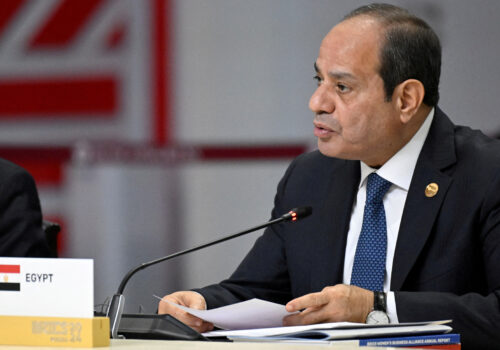Netanyahu’s Shin Bet shakeup moves Israel closer to chaos
Tuesday’s collapse of the Gaza ceasefire provided a brief reprieve for Ronen Bar, the director of Israel’s Shin Bet internal security agency, who finds himself at the center of the latest episode of domestic fallout from the infamous Hamas onslaught of October 7, 2023. But with the government of Prime Minister Benjamin Netanyahu determined to quash dissent within the nation’s civil service, Bar’s days are numbered.
The prime minister summoned Bar earlier this week to inform him of his impending dismissal. Israel’s cabinet was expected to vote on that proposal during a meeting slated for Wednesday evening. Bar’s removal after a showdown with Netanyahu risks destabilizing the Shin Bet—whose core mission includes “the defense of the state of Israel, its institutions and its democratic governance”—and also undermining social cohesion within the country, just as the Israel Defense Forces (IDF) have resumed their offensive in Gaza. A dangerous ripple effect could ensue at a moment of growing regional tension.
Netanyahu cited his compounded lack of confidence in Bar’s performance as the reason for the termination, but circumstances surrounding their feud and its consequences are considerably more tangled.
Assuming the prime minister prevails, Bar’s departure would be the latest in a growing list of senior Israeli leaders to prematurely depart their posts after working at the helm on that fateful October day. That includes, most recently, the exit of (now former) IDF chief-of-staff Herzi Halevi earlier this month. Their mea culpas stand in stark contrast to Netanyahu’s refusal to accept similar responsibility for that catastrophe.
SIGN UP FOR THIS WEEK IN THE MIDEAST NEWSLETTER
As he has purposefully deflected blame onto a host of others, Netanyahu has blocked attempts to convene an official inquest into the failings of Israel’s Gaza posture and rejected widespread calls of the Israeli public for him to seek a renewed mandate for his governance. His evasiveness is not coincidental. Polls indicate that an overwhelming majority of Israelis wish for the creation of a state commission of inquiry—and, more conclusively, for the prime minister to acknowledge his own culpability and step down from the premiership. Meanwhile, Netanyahu is neutralizing proverbial gatekeepers, clearing the road for him to appoint their successors and consolidate his power.
In the particular case of Bar, Netanyahu’s dissatisfaction appears traceable also to a series of incriminating charges—against figures in the prime minister’s close orbit—being scrutinized by the Shin Bet. Netanyahu aides are suspected of, among other things, leaking classified documents to foreign media and engaging in parallel consulting work for the Qatari regime. (To date, the prime minister himself has not been formally implicated.) Bar infuriated Netanyahu further when the findings of the Shin Bet’s October 7 probe pointed accusatory fingers not only in-house but also at questionable policy choices of Israel’s executive branch.
The exact timing of Bar’s firing was triggered evidently by a March 13 interview in which his predecessor, Nadav Argaman, warned that he would disclose privileged information pertaining to Netanyahu if “the prime minister has decided to act against the law,” leading Netanyahu to accuse both Argaman and Bar of trying to blackmail him. By Netanyahu’s logic, these incidents all speak to an orchestrated campaign by stewards of Israel’s bureaucracy to eject him and his right-wing allies from office.
Pushback against the prime minister’s gambit was swift. Bar railed stridently against what he deemed Netanyahu’s “expectation of a duty of personal loyalty” and clarified that he intends to remain at his post until the hostages are returned and several “sensitive” investigations are completed. Attorney-General Gali Baharav-Miara—the “certified interpreter of the law for state entities”—wrote to Netanyahu that Bar cannot be discharged “until the factual and legal basis underlying [the] decision is fully examined, as well as [the prime minister’s] authority to address the matter at this time,” expressing concern that the process “may be tainted by illegality and conflict of interest.”
In the next act, Netanyahu responded to the attorney-general on March 17 that she—rather than he—is abusing authority by interfering with his plans to replace Bar. The prime minister contended additionally that the alleged connections of his confidants to Qatar came under review, conspicuously, only after he resolved to sack the Shin Bet chief. Bar’s fate will be settled almost surely through appeals to the High Court of Justice, but a constitutional crisis looms: Bar has vowed to comply with the law, but Netanyahu’s open disdain for Supreme Court President Isaac Amit could put them all on an ominous collision course.
Protestors are rallying to prevent Bar’s ouster, but their impact is uncertain. Earlier demonstrations—and the efforts of a feckless Knesset opposition—have not significantly impeded the Netanyahu government from pursuing its ambitious agenda, which includes the passage of a controversial budget, changes to the judicial system, and an exemption from the military draft for the ultra-Orthodox Jewish population. In fact, moves to force out both Bar and Baharav-Miara—whom Justice Minister Yariv Levin is angling to fire as well—together with the resumption of IDF maneuvers in Gaza facilitated the recent return of Itamar Ben-Gvir’s faction to the prime minister’s coalition, expanding his margin of safety.
What will have a definite impact, however, is a dubious and untimely management turnover at the Shin Bet. The selection of a new leadership cohort under a cloud of suspicion threatens to cast the organization into turmoil in the midst of active warfare on “seven fronts.” These are not normal times. Forfeiting the experience Bar has accumulated and the relationships he has cultivated will amount to an operational deficit.
The learning curve of Bar’s successor—particularly if the nominee comes from outside the agency—could be precariously steep, presenting a severe risk for Israel (and beyond) precisely when the conflict with the Palestinians is escalating once again. Any resulting dysfunction, which would affect the execution of Israel’s security measures, will impair prospects for advancing regional calm and normalization in the near term.
The appointment of a new director by a decidedly unpopular government has also raised fears that Israel’s formidable domestic intelligence capabilities might be employed inappropriately against the prime minister’s detractors. Amid other challenges to Israel’s liberal character, this turn of events could further erode the country’s standing within the international community.
Inspired reportedly by the campaign of US President Donald Trump—whose disruptive rhetoric he is emulating closely—to slot loyalists into key administration positions, Netanyahu is poised to continue purging Israel’s professional ranks. In instances where his plans are thwarted, he will fall back undoubtedly on claims of a “deep state” conspiracy to subvert democracy. Meanwhile, Israelis will continue to debate the legitimacy of the prime minister’s motives.
Ultimately, it will prove untenable for Bar to remain at his post by sole virtue of a court order. His tenure—as that of former Defense Minister Yoav Gallant, from whose initial termination Netanyahu backtracked in March 2023, only to follow through in November 2024—is living on borrowed time.
Shalom Lipner is a nonresident senior fellow at the Scowcroft Middle East Security Initiative of the Atlantic Council’s Middle East Programs. Lipner served seven consecutive Israeli premiers over a quarter-century at the Prime Minister’s Office in Jerusalem, where his areas of core expertise included foreign policy, public diplomacy and communications, and Jewish communal affairs.
Further reading
Mon, Mar 10, 2025
Trump should embrace the Egyptian Gaza plan. It’s his best chance to secure peace.
MENASource By
The Egyptian plan offers a base to secure many parties' interests and create the required regional stability to buy time for diplomacy.
Fri, Feb 7, 2025
The aftermath of the Gaza war will determine the trajectory of US-Egypt relations
MENASource By Shahira Amin
The direction of US-Egypt relations will be determined by how US policymakers address the aftermath of the Israel-Hamas war—and how Sisi responds to Trump's idea to "take over" Gaza.
Fri, Feb 28, 2025
Trump’s Gaza plan presents Jordan’s king with an opportunity—but it’s fleeting
MENASource By
Abdullah enjoying a surge of popularity would be no insignificant development, Aaron Magid argues.
Image: FILE PHOTO: Israeli Security Agency (Shin Bet) director Ronen Bar attends a memorial ceremony in connection with the Hamas attack on October 7, 2023 that sparked the war in Gaza, at the Mount Herzl military cemetery in Jerusalem, October 27, 2024. GIL COHEN-MAGEN/Pool via REUTERS/File Photo


